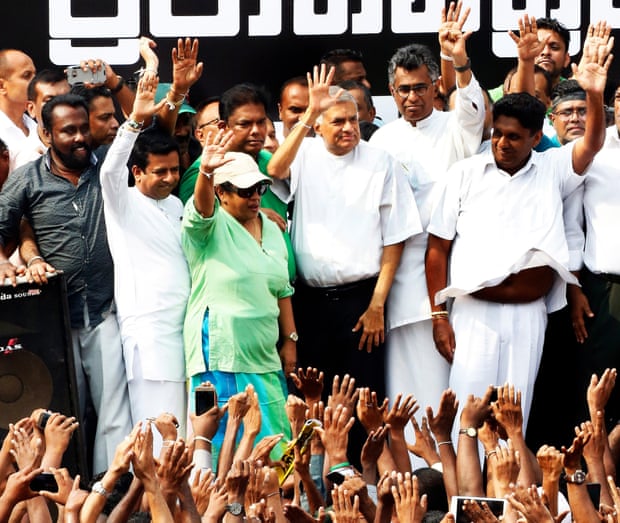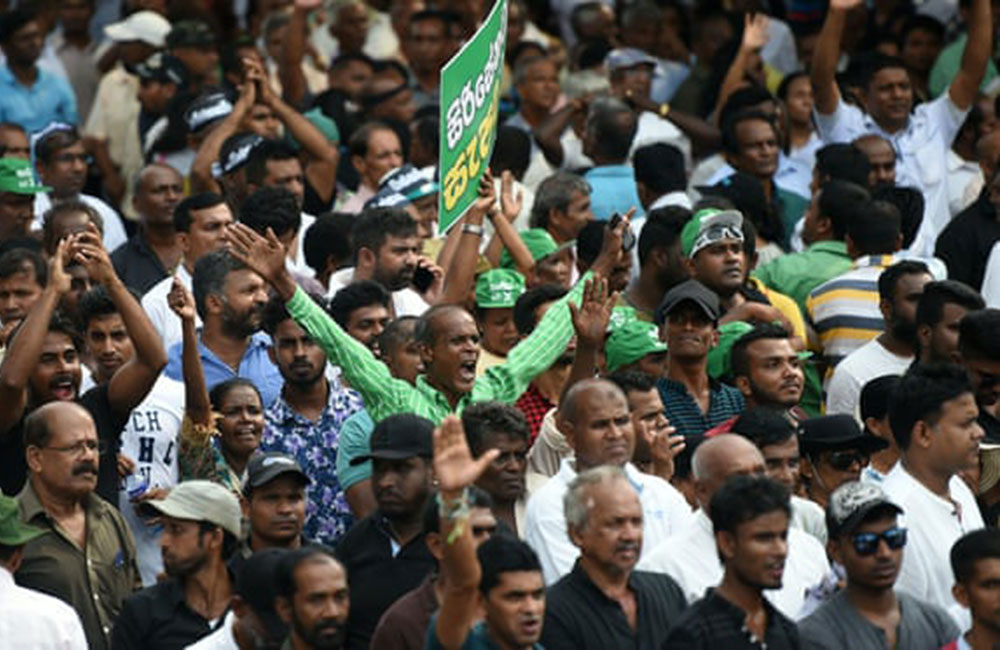Ayesha Thajudeen was one of the first people on the scene of her brother’s accident. Police said Wasim, a Sri Lankan national rugby player, had crashed his car and burned to death inside. Surveying the charred vehicle, around 4am that morning, Ayesha wasn’t so sure.
The car was sitting in a ditch; it wasn’t clear what it had struck with enough force to burst into flames. Wasim’s wallet was nowhere to be found – a stranger later discovered it about 5km away. Strangest of all: Wasim was sitting in the passenger seat, she says.
“It was obvious from the moment I was taken to the site,” Ayesha says. “It was not a death, but a murder.”
The death of Wasim Thajudeen, 28, was one of several during the Mahinda Rajapaksa era in Sri Lanka to be reexamined by police after the strongman leader was defeated in 2015.
On Tuesday, tens of thousands of people rallied in Colombo against a decision by Sri Lanka’s president to dismiss the prime minister, Ranil Wickremesinghe, and install Rajapaksa in his place.
Wickremesinghe has refused to go and both he and Rajapaksa are rallying numbers in parliament to confirm them as the legitimate prime minister when the assembly resumes, currently scheduled for 16 November.
Former Sri Lankan leader Ranil Wickremesinghe acknowledges supporters at a rally in Colombo on Tuesday. Photograph: MA Pushpa Kumara/EPA
Activists fear Rajapaksa’s return would mark the end of a series of investigations, including under a UN human rights resolution, into crimes allegedly committed during his rule, and strain a post-civil war reconciliation process that was already stalling.
“The prospect of a Rajapaksa government is not good for accountability, democracy or human rights protection,” said lawyer Bhavani Fonseka, over the shouts of protesters in Colombo Plaza on Tuesday.
She said many of the investigations into Rajapaksa’s rule that commenced after he left office had dragged anyway in the past year. “But even those moving slowly are likely to stop if Rajapaksa comes back to government.”
Namal Rajapaksa, an MP and the former president’s son, said the family’s critics had nothing to fear. “We are telling all, my father is not in the habit of taking revenge,” he told the Guardian. “We will bring stability to the country, especially the economy and then go for elections.”
The current president, Maithripala Sirisena, defected from Rajapaksa’s government in 2014 to become the consensus candidate of the opposition. He framed himself as the alternative to a government accused of corruption, disappearing dissidents into white vans and intimidating the media.
Sirisena’s victory the following year was welcomed as a new page for Sri Lankan human rights and for relations between the country’s Buddhist majority and Tamil population after a 27-year civil war.
His government relaxed the pressure on media and NGOs, promised to end abuses by security agencies and co-sponsored a UN resolution whose demands included international trials for soldiers accused of wartime atrocities. It also agreed to reopen the investigation into the death of Wasim Thajudeen.
Members of the new government claimed Thajudeen had been murdered by Rajapaksa’s security forces, possibly after falling out with members of the family. Rajapaksa has denied the claims and says they are politically motivated.
The new probe initially raised Ayesha’s hopes. But in the past year the investigation has become bogged down in bureaucratic and legal delays. She believes the case is being deliberately slowed. “I feel very sad,” she says. “I don’t think I’m going to see an end to this.”
The progress of the Thajudeen investigation reflects a wider lack of government action on human rights issues. Lawyers such as JC Weliamuna blame the fact the same Rajapaksa-era military and civilian bureaucrats remained in place in the new government.
“There was political will, but there was no bureaucratic will,” Weliamuna says.
The government also faced resistance from within. He says ultranationalist forces within Sirisena’s administration have fought efforts to comply with the UN investigation. Similarly, “elitist forces” inside Wickremesinghe’s more business-friendly party have delayed financial reforms, he says.
“Every time there was a move for reform, it was challenged within the government, as well as outside,” he says. “People feel terribly let down.”
In the northern and eastern areas still recovering from the war, there is bitter disappointment over the absence of progress in settling displaced people, ending the excesses of security forces or drawing down the military.
In July, Sri Lanka was slammed by a UN special rapporteur for failing to comply with its commitments under the UN resolution it promised to implement.
“There is a sense of apprehension here,” says Ravindra de Silva, head of the Association for Friendship and Love, a youth group based in the northern town of Vavuniya. “People are waiting to see what happens next, who will be in control and what kind of changes there will be.
“Nothing decisive has taken place when it comes to reconciliation and other related issues like the missing, so there was disappointment anyway. Now that has turned into a sense of betrayal and foreboding that the old ways might return.”
Rajapaksa’s return could raise questions over key trials of family members and associates scheduled for the coming weeks: one against his brother, Gotabaya, who was a feared defence secretary during the previous government, and another of his former chief of staff.
Also potentially under question would be post-war reconciliation agencies such as a new office dedicated to tracing the up to 20,000 people who went missing during the war, and another established to decide on reparations.
A senior officer inside one post-war reconciliation agency told the Guardian he feared his work would be quietly strangled. “Political will matters,” he said. “Our funding is allocated within government budgets, so any downward trend in funding would have an impact.”
Ayesha Thajudeen says she has all but given up hope of finding out who killed her brother. And if Rajapaksa returns to power? “We will never know,” she says.
(The Guardian)

Leave your comments
Login to post a comment
Post comment as a guest